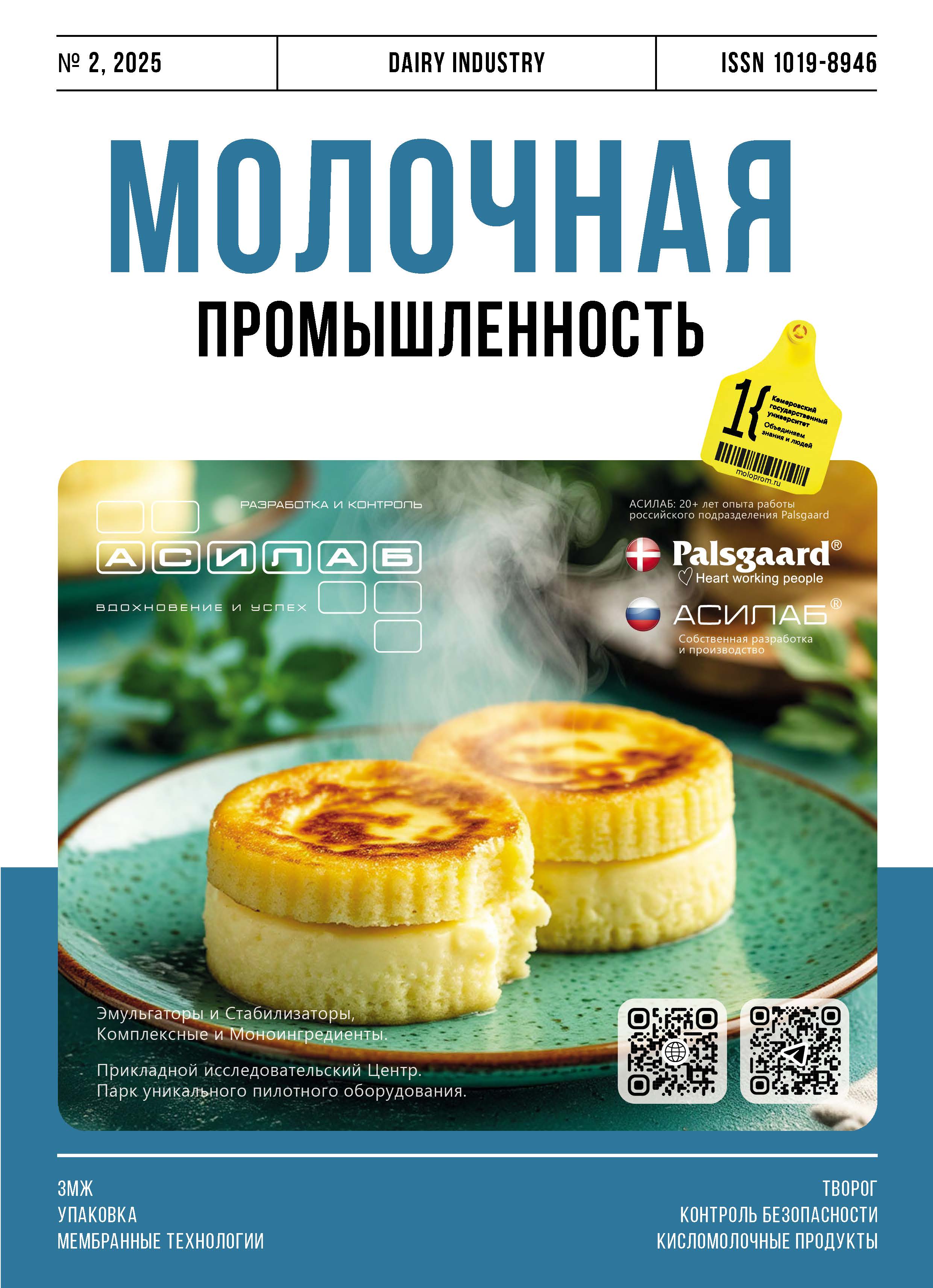Moscow, Russian Federation
Moscow, Russian Federation
Moscow, Russian Federation
Sage extract (Salvia officinalis L.) may improve the oxidative stability of butter. This research identified this effect at different storage temperatures (4, 25, and 40°C), providing a mathematical model of oxidative kinetics. The sage extract was added at a concentration of 20 mg polyphenol per 100 g butter. It inhibited the increase of peroxide, anisidine, and acid values during storage through all temperatures, which denotes a statistically significant antioxidant effect. The pseudo-first-order models and Arrhenius equations based on the accumulation of primary and secondary oxidation products made it possible to calculate the energy needed to trigger the primary and secondary oxidation reactions. The mathematical models could predict the oxidative stability of butter up to the total oxidation index. In this study, the antioxidant properties of sage prevented the peroxidation of dairy lipids, especially at elevated temperatures. The sage extract demonstrated good prospects as a natural antioxidant that improves butter stability.
butter, sage (Salvia officinalis L.), oxidative stability, phenolic compounds, mathematical modelling, activation energy
1. Bao, Y. Mechanisms of lipid oxidation in water-in-oil emulsions and oxidomics-guided discovery of targeted protective approaches / Y. Bao, M. Pignitter // Comprehensive Reviews in Food Science and Food Safety. 2023. Vol. 22(4). P. 2678–2705. https://doi.org/10.1111/1541-4337.13158
2. Choe, E. Roles and action mechanisms of herbs added to the emulsion on its lipid oxidation / E. Choe // Food Science and Biotechnology. 2020. Vol. 29(9). P. 1165–1179. https://doi.org/10.1007/s10068-020-00800-z
3. Ullah, H. Natural Polyphenols for the Preservation of Meat and Dairy Products / H. Ullah, https://doi.org/10.3390/molecules27061906
4. Fan, X. Markers and Mechanisms of Deterioration Reactions in Dairy Products / X. Fan, C. Wang, M. Cheng [et al.] // Food Engineering Reviews. 2023. Vol. 15(2). P. 230–241. https://doi.org/10.1007/s12393-023-09331-9
5. Choe, E. Mechanisms and factors for edible oil oxidation / E. Choe, D. B. Min // Comprehensive Reviews in Food Science and Food Safety. 2006. Vol. 5(4). P. 169–186. https://doi.org/10.1111/j.1541-4337.2006.00009.x
6. Nilova, L. P. Rastitel'nye ingredienty v stabilizacii okislitel'nyh processov slivochnogo masla pri hranenii / L. P. Nilova // Nauchnyy zhurnal NIU ITMO. Seriya: Processy i apparaty pischevyh proizvodstv. 2019. № 4. S. 117–123. https://doi.org/10.17586/2310-1164-2019-12-4-117-123; https://www.elibrary.ru/ztripb
7. Basheer, V. A. Mathematical modeling and kinetic behavior of Indian Umblachery cow butter and its nutritional degradation analysis under modified atmospheric packaging technique / V. A. Basheer, S. Muthusamy // Journal of Food Process Engineering. 2022. Vol. 45(8). https://doi.org/10.1111/jfpe.14042
8. Pandey, P. Evaluation of polyphenols enriched dairy products developed by incorporating black carrot (Daucus carota L.) concentrate / P. Pandey [et al.] // Heliyon. 2021. Vol. 7(5). e06880. https://doi.org/10.1016/j.heliyon.2021.e06880
9. Irakli, M. Modeling and Optimization of Phenolic Compounds from Sage (Salvia fruticosa L.) Post-Distillation Residues: Ultrasound- versus Microwave-Assisted Extraction / M. Irakli [et al.] // Antioxidants. 2023. Vol. 12(3). P. 549. https://doi.org/10.3390/antiox12030549
10. Nair, S. S. Formulation of Millet Milk and Herb Extract Enriched Yogurt and to Assess Its Nutritional Characteristics / S. S. Nair, N. Peerkhan // International Journal of Life Science and Pharma Research. 2020. Vol. 13(1). L151–L163. https://doi.org/10.22376/ijlpr.2023.13.1.L151-163
11. Pękal, A. Evaluation of Aluminium Complexation Reaction for Flavonoid Content Assay / A. Pękal, K. Pyrzynska // Food Analytical Methods. 2014. Vol. 7(9). P. 1776–1782. https://doi.org/10.1007/s12161-014-9814-x
12. Tutel'yan, V. A. Metody analiza minornyh biologicheski aktivnyh veschestv pischi / V. A. Tutel'yan, K. I. Eller, T. V. Aristarhova [i dr.]. – M.: OOO "Izdatel'stvo "Dinastiya", 2010. – 180 s. https://www.elibrary.ru/qnigub
13. Soetaert, K. A practical guide to ecological modelling: Using R as a simulation platform / ed. by K. A. Soetaert, P. M. J. Herman. – Dordrecht: Springer Science+Business Media B. V., 2009. – 372 p.
14. Abid, Y. Storage stability of traditional Tunisian butter enriched with antioxidant extract from tomato processing by-products / Y. Abid [et al.] // Food Chemistry. 2017. Vol. 233(15). P. 476–482. https://doi.org/10.1016/j.foodchem.2017.04.125
15. Darmawan, M. A. S Shelf life of indigenous tengkawang butter: Storage kinetic and effect of antioxidant to oxidation stability index / M. A. Darmawan, [et al.] // Heliyon. 2023. Vol. 9(5). e15643. https://doi.org/10.1016/j.heliyon.2023.e15643
16. Park, J. M. Determination of shelf life for butter and cheese products in actual and accelerated conditions / J. M. Park [et al.] // Korean Society for Food Science of Animal Resources. 2014. Vol. 34(2). P. 245–51. https://doi.org/10.5851/kosfa.2014.34.2.245
17. Tavakoli, H. Postmarketing surveillance of the oxidative stability for cooking oils, frying oils, and vanaspati supplied in the retail market / H. Tavakoli // Food Science & Nutrition. 2019. Vol. 7(4). P. 1455–1465. https://doi.org/10.1002/fsn3.982
18. Matthäus, B. Quality Parameters for Cold Pressed Edible Argan Oils / B. Matthäus // Natural product communications. 2013. Vol. 8(1). P. 37–41.
19. Hands, Ja. M. A Multi-Year Rancidity Analysis of 72 Marine and Microalgal Oil Omega-3 Supplements / Ja. M. Hands [et al.] // Journal of Dietary Supplements. 2024. Vol. 21(2). P. 195–206. https://doi.org/10.1080/19390211.2023.2252064
20. Mildner-Szkudlarz, S. A comparison of human and electronic nose responses to flavour of various food products of different degree of lipids oxidation / S. Mildner-Szkudlarz [et al.] // Polish Journal of Food and Nutrition Sciences. 2007. Vol. 57(2). P. 195–202.







